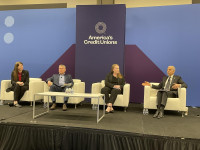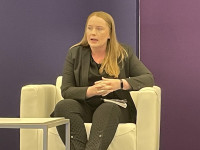Tax Status Stories Shared by International Credit Union Representatives at GAC 2025
Cost of open banking implementation also explained to U.S. audience
March 04, 2025
WASHINGTON, D.C.—Representatives from the Australian and Polish credit union systems on Tuesday warned of the fallout from credit union taxation and the cost of open banking implementation at World Council of Credit Unions’ (WOCCU) International Advocacy breakout session—Global Perspectives on Credit Union Advocacy—at America’s Credit Unions’ 2025 Governmental Affairs Conference (GAC).
With America’s Credit Unions recently launching its “Don’t Tax My Credit Union” campaign to prevent a change to the industry’s tax-exempt status, many in the audience wondered what a taxed credit union system looked like in other countries.
“Many years ago, we had a tax exemption, but now the Polish credit unions pay taxes based on the same rules and regulations as our banks,” said Rafał Matusiak, President of Poland’s National Association of Cooperative Savings and Credit Unions, and a WOCCU Board Director.
Matusiak said the change had a large impact on credit unions in Poland at the time, as it did in Australia, where the government eliminated the tax exemption for credit unions and other cooperative financial institutions more than 30 years ago.
“We had our tax exemption removed in 1994. At that time, we had around 400 different credit unions. Today we have 55, and that is no coincidence,” said Alysia Smith, Government Relations Manager at the Customer Owned Banking Association (COBA), WOCCU’s direct member association in Australia.
Open banking proves costly for credit unions
Smith, who traveled to GAC 2025 as part of the Worldwide Foundation for Credit Unions’ WYCUP Scholarship program, also warned American credit union professionals about the expense that comes with the government requiring financial institutions to implement open banking laws—which allow consumers to share their financial data with third-party developers.
The goal of open banking is to give consumers control over their own data and to create more competition and innovation of new financial products and services. While the U.S. hasn’t moved to require financial institutions to implement open banking, there is concern that will eventually happen here like it has in Australia and Europe.
“If I can give you one piece of advice—if open banking does continue along (in the United States), please push your legislators at the same time to be implementing a consumer awareness style campaign. Because open banking is not realizing the competitive benefits that were promised, because our consumers are not aware of it,” said Smith. “In fact, one of our credit unions has an anecdote that it would have been more cost efficient for them to take every customer who had signed up to open banking in their credit union down to the dealership and buy them a brand-new car than implement open banking.”
Matusiak echoed Smith’s comments, indicating that it hasn’t spawned more competition to produce more financial products or services in Poland either.
“In my opinion, apart from some improvements for people using financial services—for example the ability to view all their accounts using one online banking system—I have not noticed any major revolution,” said Matusiak.
International cooperation and the credit union difference
WOCCU International Advocacy’s team stressed how bringing these perspectives to the United States is part of the credit union difference.
WOCCU International Advocacy and Regulatory Counsel Erin O’Hern told the audience about our organization’s long track record of making a difference for credit union systems and their members in developing nations as well. But that type of work is now at risk since USAID terminated all awards for the existing international development projects WOCCU had been implementing in seven countries.
“I have to say a tremendous ‘thank you’ to the U.S. credit union system that has really rallied behind us. And we are currently going through an advocacy process to make sure those key lawmakers are aware of the important work that credit unions are doing globally, and through this USAID funding in the past, as we move forward into this new era,” said O’Hern.
Paul Andrews, WOCCU’s Vice President of International Advocacy, moderated Tuesday’s session.
You can listen to an interview with Paul and Erin about their advocacy efforts to bring foreign aid funding back to WOCCU, a recent win they had for credit unions with the Financial Action Task Force and what other things they are keeping an eye on in 2025 on Episode 46 of the Global Credit Union Podcast.
You can also click here to download a copy of WOCCU International Advocacy’s 2025 Global Regulatory Update.
World Council of Credit Unions (WOCCU) is the apex association for credit unions and other global financial cooperatives. World Council promotes the sustainable development of credit unions and other financial cooperatives around the world to empower people through access to high quality and affordable financial services. World Council advocates on behalf of the global credit union system before international organizations and works with national governments to improve legislation and regulation. Its technical assistance programs introduce new tools and technologies to strengthen credit unions' financial performance and increase their outreach.
World Council has implemented 300+ technical assistance programs in 90 countries. Worldwide, 74,634 credit unions in 104 countries serve 411 million people. Learn more about World Council's impact around the world at www.woccu.org.



